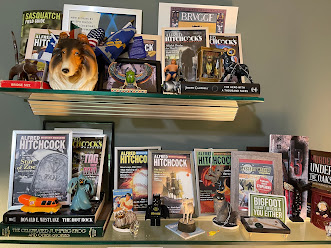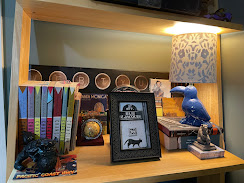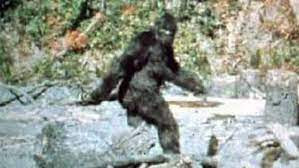The closest I have come to believing in divine insight, inspiration, or intervention—or maybe magic—is after I have written something that surprises me. I have created characters who are smarter (or nastier) than I am or ever will be. I have typed dialogue for these beings that shocks or humbles me because I know I don’t have the ability to be so kind, wise, or even so cruel. (A word to non-writers: if you want to write crime fiction, you want to access the darkness. It’s a good thing.)
When someone asks how a particular idea came to me, I always make a joke. Because I have no freaking idea. Sure, I can point to a string of plot points that I scrawled in a notebook before I started—proof of my complicity—but the finished story never quite adheres to them. And yes, I can often recall how or when I first learned certain factoids that I worked into a story, but when they pop up in my prose they are often employed in a manner I had never previously considered.
What I’m saying is that I have come to accept that Creativity is ultimately a mystery. I must leave it at that. I have no choice. The process is too ephemeral to explain any other way. In fact, I’m worried as I write this that words will fail me. We have all heard certain writers claim that the story just wrote itself, or that their characters took on a life of their own. Those sorts of pronouncements are often parodied because they sound fatuous. (Please enjoy the scene below from the film Wonder Boys that marvelously skewers that type of writer.) That’s why I have today brought into the lecture hall the words of other creatives that I have collected. These folks are far more eloquent than I am about this mystery, so I’m going turn it over to them.
The writer Kristine Kathryn Rusch, recently discussing a novelette for which she won a Reader’s Award from Asimov’s, wrote:
“‘The Nameless Dead’ has an opening that I actually heard in my sleep and managed to wake up and write it all down. I really don’t know where these stories come from, but I’m so pleased that readers like them.”Ever since my wife and I bought two paintings by the fine artist G.C. Myers some years back, I have enjoyed reading his daily blog. He’s an eclectic reader, and often the words that a writer, poet, or philosopher wrote somehow inspires his work, or suggests a title that he contemplates as he creates his canvases. Here is what he says about the process of bringing a painting to life:
“I have often written of sometimes feeling surprised when I finish a piece, as though the end result, the sum of my painting, is often far more than what I have to personally offer in terms of talent or knowledge. Like there is a force beyond me that is arranging these simple elements of this work into something that transcends the ordinariness of the subject or materials or the creator.
“This feeling has remained a mystery to me for almost twenty years, driving me to write here in hopes of stumbling across words that would adequately describe this transformation of simple paint and paper or canvas into something that I sometimes barely recognize as being my own creation, so marked is the difference between the truth of the resulting work and my own truth.”
Someone, possibly Myers, referenced a Rolling Stone interview with songwriter Jeff Tweedy, lead vocalist of Wilco. I went digging, and found a couple of interviews the magazine did with him. Here’s just one that spoke to me:
“I’m not sure I can demystify something I feel wholly inadequate to explain. For me, the moments that make my scalp tingle a little bit are when I hear myself sing a lyric out loud for the first time. On occasion I make myself cry. Not because I’m marveling at my songwriting genius or I’m overcome with my poetic gifts. It’s a moment that feels more like I’m witnessing something better than me, or better than what I imagined I could make, being born. Certain things I’ve written that, at first, didn’t strike me as being remotely worthy of being sung have, when sung for the first time, startled me by uncovering truths about myself I had no intention of revealing.”
By the way, in the same interview he talks about having to write 50 songs or “almost-songs” to get to one, or to reach a point where he is “supernaturally in touch” with his abilities. I liked that turn of phrase immensely. It beats saying what I have always told people: “It came from my subconscious—where the eff else?”
Tweedy’s phrasing reminded me of an essay on writing that I first read in my twenties, and which I have reread over the years. I’ve recommended it to readers here in the past as well. In a 1993 piece in LA Weekly, the writer Michael Ventura said he thought there was a difference between writing and other kinds of creative arts. I think he’s touching on Jung’s idea of archetypes, but you tell me:
“The psyche is dangerous. Because working with words is not like working with color or sound or stone or movement. Color and sound and stone and movement are all around us, they are natural elements, they’ve always been in the universe, and those who work with them are servants of these timeless materials. But words are pure creations of the human psyche. Every single word is full of secrets, full of associations. Every word leads to another and another and another, down and down, through passages of dark and light. Every single word leads, in this way, to the same destination: your soul. Which is, in part, the soul of everyone. Every word has the capacity to start that journey. And once you’re on it, there is no knowing what will happen.”
If Ventura is a little too heavy, then let’s get back to belittling the very question of where art comes from. In a book called The Daily Pressfield, writer Steven Pressfield asks:
“Have you seen archival footage of the young John Lennon or Bob Dylan, when some reporter tries to ask them about their personal selves? The boys deflect these queries with withering sarcasm. Why? Because Lennon and Dylan know that the part of them that writes the songs is not ‘them,’ not the personal self that is of such surpassing fascination to their boneheaded interrogators. Lennon and Dylan also know that the part of themselves that does the writing is too sacred, too precious, too fragile to be dumbed down into sound bites for the titillation of would-be idolaters (who are themselves caught up in their own Resistance). So they put them on and blow them off.”
Pressfield, whom I’ve also discussed before, thinks that creativity springs from a Muse, defined as a part of ourselves that is hidden from us but ever present and powerful. He says:
“People ask me sometimes, ‘Don’t you get lonely being in a room by yourself all day?’ No. I’m not lonely because I’m with this other ‘me,’ who is me and not-me at the same time and whom I have spent my entire life trying to find, to prove myself worthy of, and to labor in collaboration with.”
In his most famous book, The War of Art, Pressfield admits that before he starts work each morning, he prays to this Muse. His practice is to recite a few lines from the beginning of Homer’s Odyssey, believing that all any of us can do is show up for work, signaling to the universe that we intend to labor in good faith.
If you’re in the chair, determined to write, good things can’t help but show up. Or so the theory goes. The opposite corollary, of course, is that if you procrastinate, you cannot be surprised that that Muse has passed you by.
Pressfield’s “show up for work” concept reminded me of another story drawn from the world of music. The songwriter Tom Waits, who doesn’t do too many interviews, once shared this experience with the writer Elizabeth Gilbert. He was driving down the freeway when, out of the blue, a great idea for a song popped into his head. In that situation, flying down the road at sixty-plus miles per hour, Waits couldn’t exactly hit the brakes and jot down the idea. Gilbert, who has told this story a bajillion times in various interviews and her famous TED Talk, describes Waits railing at God or his Muse through his windshield:
“Excuse me, can you not see that I’m driving? Do I look like I can write down a song right now? If you really want to exist, come back at a more opportune moment when I can take care of you. Otherwise, go bother somebody else today. Go bother Leonard Cohen.”
Ok, so let’s say you know all that. You accept that you either have a Muse, or a genius mini-you-who-is-not-you within you, or you accept that you are jacked into the divine source of creation. Would it really be so bad if you ignored that call?
Well, no. Not if you want to get through this life. In an interview with Ken Burns, the late Kris Kristofferson talked about how his family disowned him when he gave up a promising career as a pilot to take a job as a janitor so he could write music on the side. In the middle of this interview, Kristofferson, who studied the Romantic poets, begins quoting from a famous letter by William Blake, which Kristofferson summarized thusly: “He’s telling you that you’ll be miserable if you don’t do what you’re supposed to do.”
He’s referring to an 1803 letter by Blake to Thomas Butts. Here’s a bit of it. You’ll forgive, I think, Blake’s punctuation and mode of expression:
“If you who are organized by Divine Providence for Spiritual communion. Refuse & bury your Talent in the Earth even tho you Should want Natural Bread. Sorrow & Desperation pursues you Thro life! after death Shame confusion of face to eternity —”
See? I started by saying that I don’t know what I’m talking about. And I think I have proved it. But I am grateful that so many people I admire have had exactly the same feeling. Bottom line: Those of us who create really don’t know know where our art comes from. We only know that it comes when we apply ourselves joyfully to the task. That is at once beautiful and relieving.
It seemed appropriate to wait until the turn of another calendar to share these quotes with you. I do so with a prayer that you will get out of your own way in the coming months and let this indescribable mystery lead you into a wonderful, productive new year.
Happy New Year. See you in three weeks!







